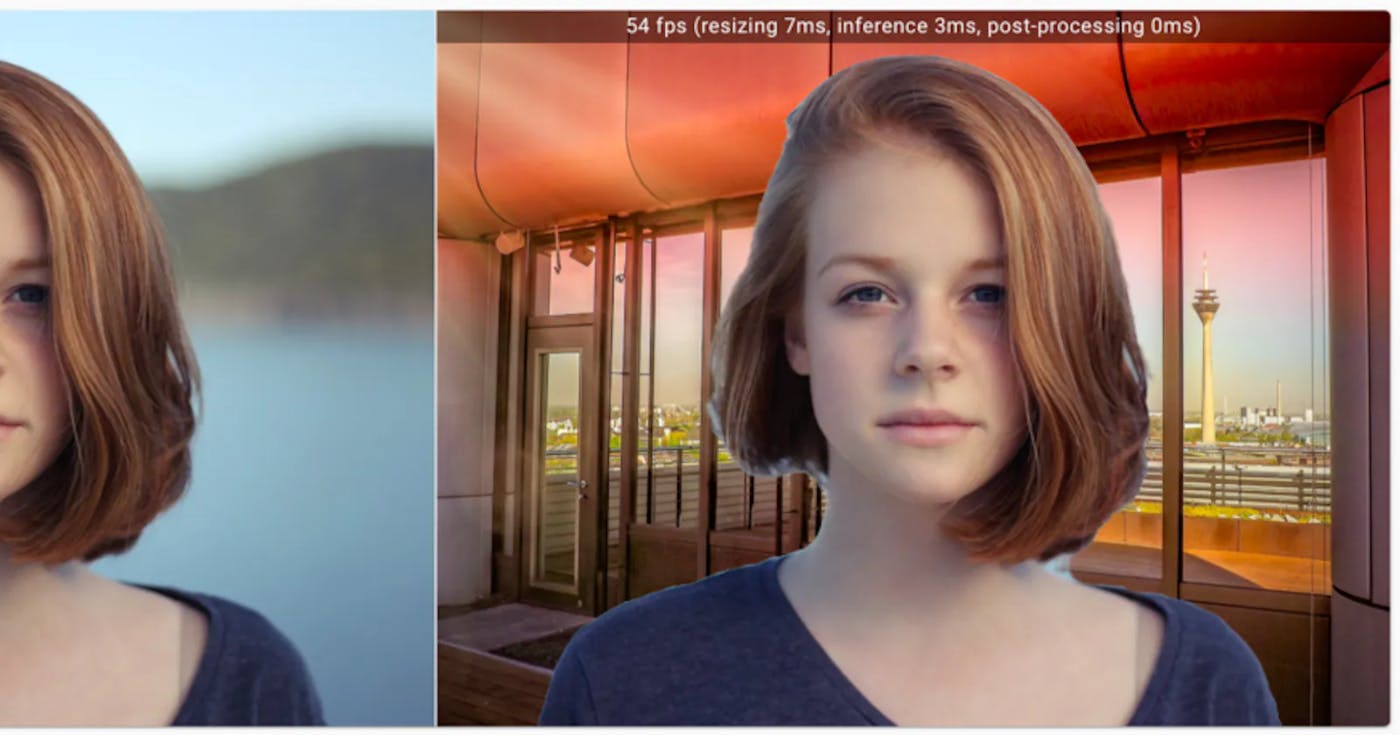
Создание виртуальных фонов в реальном времени с помощью BodyPix и веб-камеры в HTML и JavaScript
2 ноября 2023 г.Этот код HTML и JavaScript создает виртуальный фоновый эффект для изображения с веб-камеры на веб-странице. Он использует библиотеку BodyPix для отделения человека от фона в режиме реального времени и замены фона изображением.
Пользователи могут запускать и останавливать эффект виртуального фона с помощью кнопок. Код разработан с учетом адаптивного дизайна и позволяет пользователям выбирать между моделями сегментации MobileNetV1 и ResNet50. Это интересный и интерактивный способ улучшить видеозвонки с помощью виртуального фона.
<!DOCTYPE html>
<html lang="en">
<head>
<meta charset="UTF-8">
<meta name="viewport" content="width=device-width, initial-scale=1.0">
<title>Virtual Background</title>
<style>
/* Add CSS styles for responsive design */
body {
margin: 0;
padding: 0;
display: flex;
flex-direction: column;
align-items: center;
justify-content: center;
height: 100vh;
background-color: #f0f0f0;
}
#videoContainer {
width: 100%;
max-width: 600px; /* Adjust the maximum width as needed */
position: relative;
}
video, canvas {
width: 100%;
height: auto;
border-radius: 1rem;
}
img {
max-width: 100%;
height: auto;
}
button {
margin: 10px;
padding: 10px 20px;
font-size: 18px;
border-radius: 1rem;
border: none;
cursor: pointer;
background-color: #e3e3e3;
}
button:hover {
background-color: #1D2026;
color: #FFF;
}
#errorText {
width: 50%;
color: red;
font-weight: bold;
}
</style>
<!-- Include the BodyPix library -->
<script src="https://cdn.jsdelivr.net/npm/@tensorflow/tfjs/dist/tf.min.js"></script>
<script src="https://cdn.jsdelivr.net/npm/@tensorflow-models/body-pix/dist/body-pix.min.js"></script>
</head>
<body>
<!-- https://shubhampandey.in/removing-background-in-realtime/ -->
<p id="errorText"></p>
<!-- Create a container for the video and canvas elements -->
<div id="videoContainer">
<!-- Create a video element for the webcam feed -->
<video id="videoElement" playsinline></video>
<!-- Create a canvas element for the background -->
<canvas id="backgroundCanvas" playsinline hidden></canvas>
</div>
<!-- Example of adding a background image (replace the img src attribute with your image file) -->
<img id="yourBackgroundImage" src="https://i.postimg.cc/t9PJw5P7/forest.jpg" style="display: none;">
<!-- Add buttons for user interaction -->
<button id="startButton">Start Virtual Background</button>
<button id="stopButton" style="display: none;">Stop Virtual Background</button>
<script>
// Initialize variables
let isVirtual = false;
// DOM elements
const videoContainer = document.getElementById('videoContainer');
const videoElement = document.getElementById('videoElement');
const canvasElement = document.getElementById('backgroundCanvas');
const backgroundImage = document.getElementById('yourBackgroundImage');
const ctx = canvasElement.getContext('2d');
const startButton = document.getElementById('startButton');
const stopButton = document.getElementById('stopButton');
const errorText = document.getElementById('errorText');
// MobileNetV1 or ResNet50
const BodyPixModel = 'MobileNetV1';
async function startWebCamStream() {
try {
// Start the webcam stream
const stream = await navigator.mediaDevices.getUserMedia({ video: true });
videoElement.srcObject = stream;
// Wait for the video to play
await videoElement.play();
} catch (error) {
displayError(error)
}
}
// Function to start the virtual background
async function startVirtualBackground() {
try {
// Set canvas dimensions to match video dimensions
canvasElement.width = videoElement.videoWidth;
canvasElement.height = videoElement.videoHeight;
// Load the BodyPix model:
let net = null;
switch (BodyPixModel) {
case 'MobileNetV1':
/*
This is a lightweight architecture that is suitable for real-time applications and has lower computational requirements.
It provides good performance for most use cases.
*/
net = await bodyPix.load({
architecture: 'MobileNetV1',
outputStride: 16, // Output stride (16 or 32). 16 is faster, 32 is more accurate.
multiplier: 0.75, // The model's depth multiplier. Options: 0.50, 0.75, or 1.0.
quantBytes: 2, // The number of bytes to use for quantization (4 or 2).
});
break;
case 'ResNet50':
/*
This is a deeper and more accurate architecture compared to MobileNetV1.
It may provide better segmentation accuracy, but it requires more computational resources and can be slower.
*/
net = await bodyPix.load({
architecture: 'ResNet50',
outputStride: 16, // Output stride (16 or 32). 16 is faster, 32 is more accurate.
quantBytes: 4, // The number of bytes to use for quantization (4 or 2).
});
break;
default:
break;
}
// Start the virtual background loop
isVirtual = true;
videoElement.hidden = true;
canvasElement.hidden = false;
display(canvasElement, 'block');
// Show the stop button and hide the start button
startButton.style.display = 'none';
stopButton.style.display = 'block';
async function updateCanvas() {
if (isVirtual) {
// 1. Segmentation Calculation
const segmentation = await net.segmentPerson(videoElement, {
flipHorizontal: false, // Whether to flip the input video horizontally
internalResolution: 'medium', // The resolution for internal processing (options: 'low', 'medium', 'high')
segmentationThreshold: 0.7, // Segmentation confidence threshold (0.0 - 1.0)
maxDetections: 10, // Maximum number of detections to return
scoreThreshold: 0.2, // Confidence score threshold for detections (0.0 - 1.0)
nmsRadius: 20, // Non-Maximum Suppression (NMS) radius for de-duplication
minKeypointScore: 0.3, // Minimum keypoint detection score (0.0 - 1.0)
refineSteps: 10, // Number of refinement steps for segmentation
});
// 2. Creating a Background Mask
const background = { r: 0, g: 0, b: 0, a: 0 };
const mask = bodyPix.toMask(segmentation, background, { r: 0, g: 0, b: 0, a: 255 });
if (mask) {
ctx.putImageData(mask, 0, 0);
ctx.globalCompositeOperation = 'source-in';
// 3. Drawing the Background
if (backgroundImage.complete) {
ctx.drawImage(backgroundImage, 0, 0, canvasElement.width, canvasElement.height);
} else {
// If the image is not loaded yet, wait for it to load and then draw
backgroundImage.onload = () => {
ctx.drawImage(backgroundImage, 0, 0, canvasElement.width, canvasElement.height);
};
}
// Draw the mask (segmentation)
ctx.globalCompositeOperation = 'destination-over';
ctx.drawImage(videoElement, 0, 0, canvasElement.width, canvasElement.height);
ctx.globalCompositeOperation = 'source-over';
// Add a delay to control the frame rate (adjust as needed) less CPU intensive
// await new Promise((resolve) => setTimeout(resolve, 100));
// Continue updating the canvas
requestAnimationFrame(updateCanvas);
}
}
}
// Start update canvas
updateCanvas();
} catch (error) {
stopVirtualBackground();
displayError(error);
}
}
// Function to stop the virtual background
function stopVirtualBackground() {
isVirtual = false;
videoElement.hidden = false;
canvasElement.hidden = true;
display(canvasElement, 'none');
// Hide the stop button and show the start button
startButton.style.display = 'block';
stopButton.style.display = 'none';
}
// Helper function to set the display style of an element
function display(element, style) {
element.style.display = style;
}
// Helper function to display errors
function displayError(error){
console.error(error);
// Display error message in the <p> element
errorText.textContent = 'An error occurred: ' + error.message;
}
// Add click event listeners to the buttons
startButton.addEventListener('click', startVirtualBackground);
stopButton.addEventListener('click', stopVirtualBackground);
// Start video stream
startWebCamStream();
</script>
</body>
</html>
Оригинал

